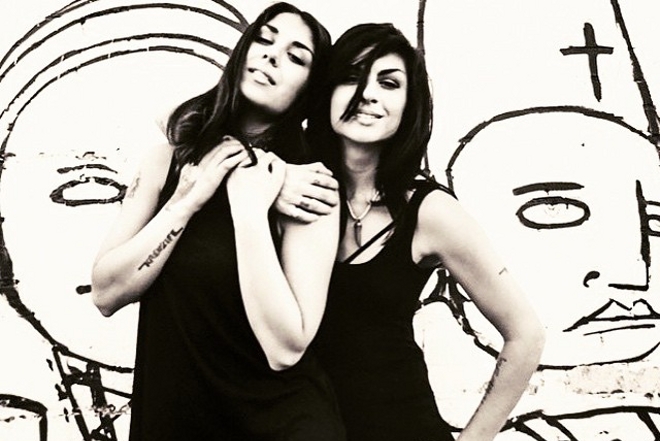It’s stating the obvious that women aren’t as visible in EDM as the guys. Plenty come up with excuses: Women aren’t as interested in technology, you just have to look harder, or women just aren’t as good producers.
This, of course, doesn’t mean that women are completely absent. Several have become successful subgenre performers: JES as a singer, producer, and tastemaker in trance, Ellen Allien, Annie Mac, Nicole Moudaber and Nina Kraviz in techno, Maya Jane Coles, and Rebecca and Fiona, to name a few.
Yet, unless you’ve been away from the internet for the past two months, the most prominent female EDM performers (or those receiving the most immediate attention) are Krewella. From a commercial standpoint, it makes sense. Their debut album, Get Wet, hit the Billboard Top 20 in 2013 and the group formerly of two singers and a producer have had two hit singles not just in the dance music world but in the pop sphere, as well. Editorials and news pieces put the now-duo of sisters Jahan and Yasmine Yousef as the face of women in EDM, but should they have this distinction?
They’re Singers in a Producer’s World
Both sisters seem to expel a fair amount of breath saying that they produce and DJ, too, but if you look at dance music’s last 40 years of history, the only acceptable place for a woman was as a singer. It extended from disco through freestyle, house, and techno in the ‘80s, defined the producer-face relationship of Eurodance, and continued through many trance and electro house singles in the ‘00s. Krewella, essentially, are filling the only role women have been able to readily obtain. When female performers need to be pushing boundaries, Jahan and Yasmine just show that they’re “good girls” playing a boys’ game – they’re involved but far from equal.
And as much as they claim to be the whole package, who would, really, have these two come onto a track to produce? Collaborations like Nicky Romero’s “Legacy” show where they stand – as singers and video eye candy.
As well, now that the Kris “Rain Man” Trindl is out, can they even call themselves a dance music act anymore? The two might as well be pop stars who collaborate with a series of producers.
They’re Drama Queens
Krewella finish out the trifecta of female stereotypes with one aspect, which has been especially apparent in 2015: They’re almost constantly embroiled in drama.
For an example, consider the lawsuit from former bandmate Kris “Rain Man” Trindl, who’s now pursuing a career as a solo artist. Based on statements from The Hollywood Reporter, there’s really no clear side to take. Rain Main alleges the sisters mistreated him by leaving him out of promotional materials starting in 2013 and is owed payment for his work in 2013 and 2014. Furthermore, the group’s former producer claims the two intentionally shut him out to increase profits for themselves. Yet, Trindl had developed alcohol and drug habits, had to go to rehab, and ended up being absent as a result.
Trindl’s attorney additionally claims that he was the group’s sound: “When they met,
Rather than just counteract the claims, the two remaining Krewella members essentially went on an attack to destroy Trindl’s credibility as a DJ and producer, stating they did all of the DJing, he only contributed four tracks to their debut, and he had only been added to complete the look. Court papers state: “While on stage, Kris would generally stand to the side of Jahan and Yasmine and pump his arms, while pretending to DJ; he was onstage primarily for the sake of image. Because Kris did not know how to DJ, he only had two effect buttons.”
Statements alone don’t exist in a vacuum, and following The Hollywood Reporter’s 2014 write-up, Deadmau5 started #Unpluggedgate, claiming Krewella didn’t have their CDJs connected at Ultra, and Jahan published two articles about how hard it is to be a woman in EDM: one, a Tumblr post captured by YourEDM.com, and a second a Billboard editorial, in which she says:
“I am asking for everyone to think about girls who are looking at this public reaction who might now be discouraged to pursue an authentic place in a male-dominated industry.
“It’s almost as if being the female in the group, it’s assumed that you are purely there as a puppet and completely void of any musical abilities, creativity, or vision. My analysis of the public reaction is a wakeup call that there is still a stigma associated with being a woman: that I am a conspiring and manipulative free-loader who doesn’t work as hard or is as talented as a man- and that I use sex to advance my career.”
Good platform, if you can back it up. There’s a saying that women have to work twice as hard to get half as far, but when plenty of more talented female dance music performers exist out there, how does bobbing up and down and singing off-key mean you deserve respect? Krewella may have had a live band at Ultra 2015, but their 2013 performance makes you wonder: If these two girls can’t sing that well, if Rain Man couldn’t bother to fulfill his production or DJing duties, and if no one’s really DJing, who signed these twits, where’s Seth Troxler to call them out on their mainstream entitlement, and how much studio help are they getting?
Pretty Girls Get Attention; Talented Ones Sit in the Background
YourEDM.com’s parody piece, about Krewella and Paris Hilton joining up to be the Spice Girls of EDM, paints an accurate portrait of Krewella’s career: They’re the talent-lacking pretty girls getting the attention. And considering their career only began in 2011, much of what they have has been handed to them, without the songwriting experience, transcending trends, or longevity of someone like JES or Coles.
Within the male-dominated world of EDM, this, too, has been an issue. When Hardwell topped DJ Mag’s Top 100 list, those with more experience cried out that this twerp didn’t deserve to be there. Similarly, others with longer careers pointed out that Avicii and Martin Garrix shouldn’t have been placed on Ultra’s main stage.
And much in the same vein, being a woman associated with an EDM sound shouldn’t create an automatic spot for Krewella to speak for all female producers. Yes, it’s a hard and competitive industry, but if you haven’t truly worked for it, you don’t deserve to be there.




